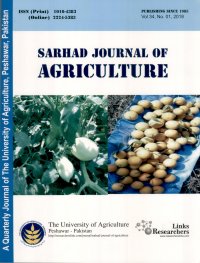Nitrogen Split Application Timing Effect on Wheat Intercrop with Selected Species for Sustainable Production
Nitrogen Split Application Timing Effect on Wheat Intercrop with Selected Species for Sustainable Production
Muhammad Salman Wazir and Mohammad Akmal
ABSTRACT
This study was focused on N split application timing effect on wheat performance as sole or intercrop with other selected species. The study was conducted at Agronomy Research Farm, the University of Agriculture, Peshawar, during winter 2015-16. Treatments included cropping pattern viz. sole and intercrop of lines with 1:1 ratio i.e. one wheat row followed by one other crop species and 2:1 ratio i.e. two wheat rows followed by one other crops rows of Brassica (Brassica juncea), Fababean (Vicia faba) and Sunflower (Helianthus annuus), hereafter, referred as IC-I and IC-II. The N splits were applied of the total recommended 120 kg ha-1 N in splits, i.e. N splits application (NS) viz. NS1 (50% sowing and 50% tillering), NS2 (25% sowing: 50% tillering and 25% anthesis) and NS3 (25% sowing, 25% tillering and 50% anthesis). Experimental design was a randomized complete block, replicated three times. Results showed a delay in maturity with taller plants at the split N application of NAT2 and NS3 as compared to the NS1. Likewise, better traits of wheat plant and hence the yield including grain wet gluten content were reported for the treatment NS3 as sole wheat crop, followed by the intercropped with fababean. Among the intercropping, IC-I with fababean showed better future scope of wheat crop production under the changing climate to produce higher production per unit area with sustainable soil use under cereal cropping system. Among the tested species sunflower and flax were not suitable choices as IC with wheat. The study concluded with the expected increase in rainfall of the changing climate in KP which is expected at the time of the wheat crop at anthesis, three N splits application i.e. NS2 and NS3 are the best options over NS1 for wheat crop in KP. Further, to adding that it minimized lodging resistant of intercrop over sole wheat and that wheat intercrop with fababean has a potential to harvest quality grains with sustainable soil management at wheat – maize cropping system
To share on other social networks, click on any share button. What are these?







